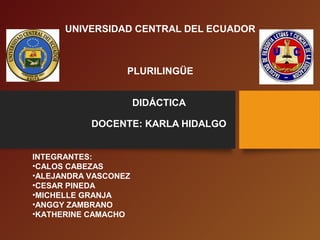
First and Second Language acquisition by Carlos Cabezas
- 1. UNIVERSIDAD CENTRAL DEL ECUADOR PLURILINGÜE DIDÁCTICA DOCENTE: KARLA HIDALGO INTEGRANTES: •CALOS CABEZAS •ALEJANDRA VASCONEZ •CESAR PINEDA •MICHELLE GRANJA •ANGGY ZAMBRANO •KATHERINE CAMACHO
- 2. WHAT IS LANGUAGE? “CAPACITY TO COMMUNICATE”
- 3. THEORIES ABOUT LANGUAGE ORIGIN 1. THE BOW-WOW THEORY
- 4. HIGH THINGS 2. THE POOH-POOH THEORY 3. THE DING-DONG THEORY LOW THINGS Close back rounded vowel
- 5. THE YO-HE-HO THEORY THE TA-TA THEORY
- 7. This term refers to the language a person learns from birth. 1st Languaje 2nd Languaje It refers to a language which is not a mother tongue but which is used for certain communicative functions in a society. It’s learned after the first language
- 8. FEATURE L1 ACQUISITION L2 (FOREIGN LANGUAGE) ACQUISITION 1. Overall success children normally achieve perfect L1 mastery adult L2 learners are unlikely to achieve perfect L2 mastery 2. General failure success guaranteed complete success rare 3. Variation little variation in degree of success or route L2 learners vary in overall success and route 4. Goals target language competence L2 learners may be content with less than target language competence or more concerned with fluency than accuracy 5. Intuitions children develop clear intuitions about correctness L2 learners are often unable to form clear grammaticality judgments 6. Instruction not needed helpful or necessary 7. Negative evidence correction not found and not necessary correction generally helpful or necessary Differences between L1 and L2 acquisition
- 9. HOW A CHILD ACQUIRES LANGUAGE.
- 10. HOW AND ADULT ACQUIRED A LANGUAGE?
- 12. ACQUISITON LEARNING IMPLICIT, SUBCONSCIOUS EXPLICIT, CONSCIOUS NATURAL ARTIFICIAL PERSONAL TECHNICAL SPOKEN LANGUAGE WRITTEN LANGUAGE PRACTICE THEORY ACTIVITIES IN THE LANGUAGE ACTIVITIES ABOUT THE LANGUAGE FOCUS ON COMMUNICATION FOCUS ON FORM PRODUCES AN ABILITY PRODUCES KNOWLEDGE DEPENDS ON ATTITUDE DEPENDS ON APTITUDE
- 13. PERSONAL COMMENTARY • Right now we as future teachers, have to understand the difference between the two words, acquisition and learning, because our students will learn a language. We have to know how the learning process works, to make it really for everyone to catch the ideas and really comprehend the grammar of any language. Of course we as a group wanted to contain all the main concepts of all the terms; that’s why we looked up in books and on internet the information that we needed. And thanks to that research we could answers questions and obtain new information about Didactics.- Carlos Cabezas • The question-answer work was an integrative activity. It allowed us to learn some of the bases of the subject. At the same time, we shared ideas and opinions about each questions. Thus, it helped us to form knowledge through dialogue between our classmates.- Cesar Pineda • Our work was participatory, because all members help to do the homework, we as future teachers must learn to work together. Our work was interesting and we don't have problem to do it, maybe because we are friends and we have the respect and the obligation with each other for not do the things wrong. –Anggy Zambrano
- 14. • I strongly believe that as much as you learn , it is the best .Principally if you want to become an excellent teacher .That is why I founded very interesting the topics that we were investigating and discussing. I realized that there are a lot of information in the internet about the themes so we did not know which information is the correct , because most of the times the authors have different points of view. That is the thing that I founded a Little bit difficult. On the other hand I really enjoyed reading and looking for the best answers to our group´s questions. I believe that all of this information in our mind is going to work in our professional life.-Alejandra Vasconez • In my opinion this kind of work groups are very important and necessary because we learn to study in group working with all ideas from our partners, so it's interesting hare good moments where the knowledge is indispensable. I think that relationship could be better if students work in that way- Michelle Granja • In my opinion this work was very funny and interesting; because when we interact with my friend we learn and understand all about that our topic. Other thing very important was that the topic was easy to now because all the integrand worked very well.- Katherine Camacho PERSONAL COMMENTARY
- 15. BIBLIOGRAPHY • Dubois, J; Giocomo, M; guespin, L; Marcelles, J y C; Mevel, J (1986). “Diccionario de lingüística”.Ed. Alianza. España: Madrid • Consuegra, Natalia (2010). ” Diccionario de psicología”. 2da Ed. Ecoe Ediciones. • Newmeyer, Frederick (2000). “ language form and language function”. Ed. First MIT. England: London. • Clark, Eve. (2003). First Language Acquisition. Cambridge University Press. • Ingram, David. (1989). First Language Acquisition: Method, Description and Explanation. Cambridge University Press. • Lust, Barbara. (2006). Child Language: Acquisition and Growth. Cambridge University Press. • Pecchi, Jean. (1994). Child Language. London: Routedge. • Saxton, Matthew. (2010). Child Language: Acquisition and Development. London: SAGE.
- 16. WEBGRAPHY • Center for adult English language acquisition. “Second language acquisition in Adults: From Research to Practice”. Disponible en: http://www.cal.org/caela/esl_resources/digests/SLA.html • Acquisition. (n.d.). Dictionary.com Unabridged. Retrieved from Dictionary.com website: http://dictionary.reference.com/browse/acquisition • Birner, Betty. (1994). Language Acquisition. Retrieved from: http://www.linguisticsociety.org/sites/default/files/Language_Acquisiti on.pdf • Cicerchia, Meredith. (2014). Language learning vs. language acquisition. Retrieved from: https://lingua.ly/blog/language-learning-vs-language- acquisition/ • Learning. (n.d.). Merrian-Webster Dictionary. Retrieved from Merriam- webster.com website: http://www.merriam- webster.com/dictionary/learning • Theories of Language Development. (n.d.) Language Development. Retrieved from: http://languagedevelopment.tripod.com/id15.html